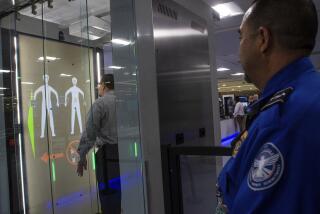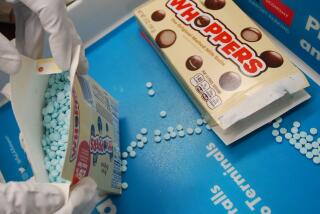‘Randomizers’ could ward off airport profiling accusations
- Share via
In the foreseeable future, fliers can expect to be “randomized” by the Transportation Security Administration.
That means an electronic device would randomly direct travelers to different screening lines.
One reason these “randomizers” are needed, federal officials said, is so TSA officers can’t be accused of profiling passengers when they direct some fliers to a line for regular screening and others to a line for a faster, less-intrusive search.
In many airports, the TSA operates special screening lines where travelers don’t have to remove their shoes, belts and jackets or take laptops and liquids out of carry-on bags. These lines are usually reserved for frequent fliers who submit an application with their background information.
Passengers who are chosen for extra screening by explosives-sniffing dogs or “behavior detection officers” won’t be allowed to use those faster lines, but the randomizer could sort all other passengers, officials said.
TSA officials would not comment in detail on the randomizer except to say in a statement that the agency “employs a multilayer approach to security, utilizing measures that are both seen and unseen and will always incorporate random and unpredictable security measures.”
Officials said they didn’t yet have an estimate on when the randomizer might appear at airports.
Iberia fliers can print baggage tags at home
At Iberia Airlines, you can now bag it and tag it yourself.
The Spanish airline says it is the only carrier to let passengers print out their own baggage tags at home. Seattle-based Alaska Airlines tested home-tagging for passengers flying from Seattle to Hawaii last year but has not continued the program. Alaska, along with several other carriers, lets passengers print out luggage tags from airport kiosks.
At Iberia, ticketed passengers print their luggage tags at home and download their boarding passes onto their smartphones. Once at the airport, Iberia fliers simply hand their luggage to a counter attendant and head for their screening gate, where they flash the boarding pass on their smartphone screen.
The technology can cut as much as 30 minutes off the time passengers spend waiting in line at airports.
Iberia is testing the luggage tag system on domestic flights in Spain before expanding the system to international flights in a few weeks.
“As you can imagine, the time it saves varies very much depending on the airport, the day and the moment the passenger goes to the check-in area, but at peak moments it can save up to 30 minutes,” said Iberia spokesman Santiago de Juan Martinez.
Hotel room pilferage is common
Most likely everyone who has stayed at a hotel has, at some point, walked out with a few bars of soap or miniature bottles of shampoo stuffed into their luggage.
But 35% of global travelers say they make off with more-valuable hotel amenities, such as towels, lamps, robes and bedding, according to a recent survey by the hotel booking site Hotels.com.
And the survey found that travelers from some countries pilfer more than others.
Danish travelers are the least likely to pocket hotel property; Colombian travelers came in at the bottom of the honesty ranking, according to the survey of 8,600 travelers from 28 countries and cities.
When asked about taking from hotels, 88% of Danish travelers said they had never pocketed hotel property, according to the survey. But when they do steal, the most common items taken by the Danes are magazines and books, the survey found.
Meanwhile, only 43% of Colombians say they have never taken from a hotel, and when they do filch, they go after magazines and books, the survey said.
The U.S. and China came in near the bottom of the honesty ranking. They were tied, with 66% of American and Chinese travelers saying they had never taken from a hotel. Sticky-fingered Americans typically take linen and towels. Chinese travelers usually take furnishings such as lamps, clocks and artwork, according to the survey.
More to Read
Inside the business of entertainment
The Wide Shot brings you news, analysis and insights on everything from streaming wars to production — and what it all means for the future.
You may occasionally receive promotional content from the Los Angeles Times.










